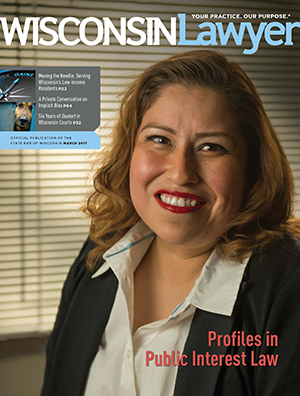
March 14, 2017 – The print March Wisconsin Lawyer™ is now hitting mailboxes. But why wait? Read how 10 lawyers are serving the public interest in different capacities and settings. What are their challenges? Satisfactions? Then take a broader look at the state of access to justice for low-income residents in Wisconsin. Who is doing what? What are the gains over the past 16 years? Remaining gaps? Here’s an overview of what you’ll find in this issue.
Practicing in the Public Interest
Lawyers choose to practice in the public interest for many reasons. They’re passionate about providing access to justice for unrepresented or underrepresented people or groups. They like the variety of legal work. Their work is meaningful and gives them personal satisfaction. They get to work in the “trenches” and effect change. In “Profiles in Public Interest Law,” 10 lawyers talk about why they pursue a public interest career.
Increasing Access to Justice
Wisconsin has made progress in providing legal services for the state’s low-income residents, but the need still outpaces the available resources. In “Moving the Needle: Serving Wisconsin’s Low-income Residents,” Jeff Brown, the State Bar’s pro bono program manager, looks at some of the great things happening, the individuals and groups that work to increase access to legal assistance for low-income residents, and remaining significant access to justice gaps.
As important as access to justice is equal justice. As State Bar President Fran Deisinger noted in his February column, Wisconsin has some of the nation’s worst rates of incarceration for members of racial and ethnic minorities, and he announced a new justice initiative: bringing together members to examine and find ways to reduce those disparities. This month, in “When Challenges Beckon, Lawyers Respond,” Deisinger reports that nearly 50 Wisconsin lawyers recently met at the State Bar Center to begin work on this justice system issue.
In “On Pro Se Litigants: Three Judges’ Views,” three circuit court judges talk about handling pro se litigants in the courtroom and give advice to lawyers when facing pro se opposition. For some people, going pro se is the only way they can afford to access the courts.
In “A Private Conversation on Implicit Bias and Race,” Milwaukee County Circuit Court judge Joe Donald says to resolve the issue of disparate treatment and mass incarceration, we have to become aware of our own implicit biases and confront their influence on arrest, bail, and sentencing decisions.
Admitting Expert Witness Testimony
In “Guarding the Gate: Six Years of Daubert in Wisconsin Courts,” Waukesha County Circuit Court judge Michael Aprahamian looks at the published Wisconsin appellate court decisions in which the Daubert rule has been applied and assesses Daubert’s effect on Wisconsin trial court practice. While the sea change in the law that some legal observers expected has not happened, he advises lawyers to make a detailed record in the trial court showing why the expert opinions they hope to offer into evidence are reliable and comply with Daubert.
Other Columns: Innovative Thinking, Influencing Public Opinion, Put It in Writing
10 Questions: In “Brian Potts: Building a Better Mousetrap, er, Keyboard,” read how due to frustration that his generic keyboard didn’t support his “legal” writing needs, Brian Potts invented the LegalBoard just for lawyers.
Solutions: In “Client Advocacy Outside the Courtroom,” Karl Robe says persuading mission-critical audiences of the merits of a client’s case can be nearly as important as convincing a judge or jury. But in “Client Advocacy Outside the Courtroom: An Ethics Cautionary Tale,” State Bar ethics counsel Aviva Meridian Kaiser warns that attempting to get your client’s position portrayed fairly in the media is one thing. Trying your case in the press is quite another. It can be easy to cross the ethics line.
Managing Risk: In “Document Everything: It’s Vital to Managing Risk,” Tom Watson cautions anything you don’t write down can be used against you if an unhappy client challenges the results of litigation, a transaction, or some other aspect of a representation.
Ethics: In “Clients Can Receive Copies of Messages to Opposing Counsel,” Dean Dietrich says sending a client a blind copy of correspondence sent to the other party’s lawyer does not violate the ethics rules, but there’s a better way to do it.
Your State Bar: In “Déjà vu Again?” George Brown says “alternative” billing arrangements aren’t so unconventional – or new. They’ve been around in various forms for many years.
Check out the March Wisconsin Lawyer.
Links to Other Content:
